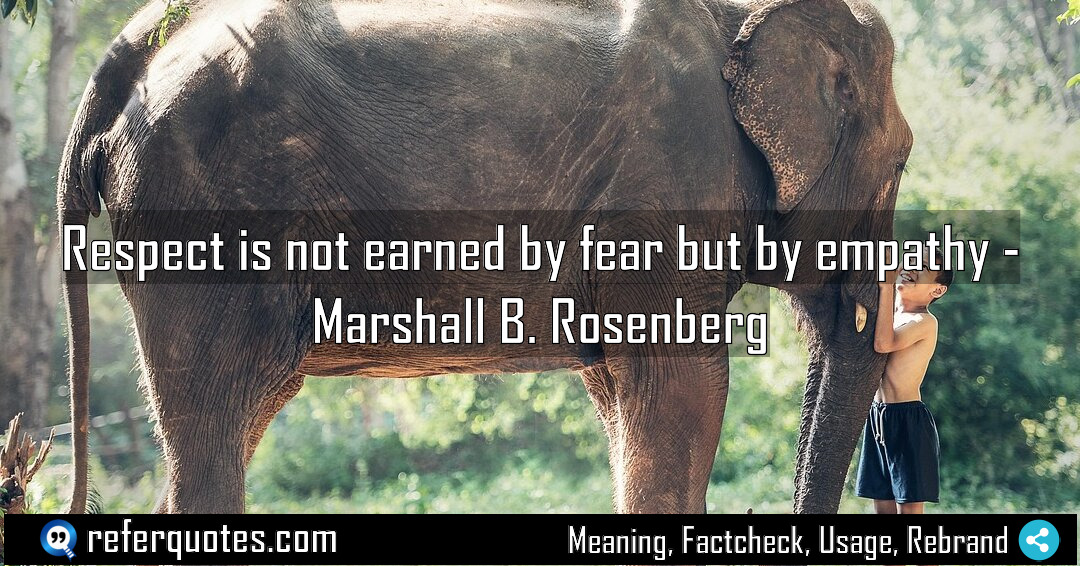
Respect is not earned by fear but by empathy—a simple truth that flips traditional authority on its head. It’s a game-changer for anyone in a leadership or parenting role. This idea moves us from demanding respect to cultivating it through genuine connection.
Share Image Quote:
Table of Contents
Meaning
The core message here is that true, lasting respect comes from understanding and caring about another person’s feelings and needs, not from intimidating them into compliance.
Explanation
Let me break this down. For years, we’ve been sold this idea that to be respected, you need to be tough, maybe even a little scary. You know, the whole “command and control” model. But what Rosenberg is saying—and what I’ve seen play out time and again—is that fear-based respect is incredibly fragile. It’s a house of cards. The second the threat is gone, the “respect” evaporates. Empathy, on the other hand, builds something real. When you genuinely try to understand where someone is coming from, when you listen to their needs and make them feel heard, that builds a deep, authentic respect. It’s a respect that’s reciprocal and resilient. It’s not about being permissive; it’s about being connected.
Quote Summary
Reading Level68
Aesthetic Score84
Origin & Factcheck
This gem comes directly from Marshall B. Rosenberg’s 2005 book, Raising Children Compassionately: Parenting the Nonviolent Communication Way. It’s a core tenet of his Nonviolent Communication (NVC) framework. You sometimes see similar sentiments floating around, attributed vaguely to “Eastern philosophy” or other thinkers, but this specific phrasing is Rosenberg’s, born from his life’s work in conflict resolution.
Attribution Summary
Where is this quotation located?
| Quotation | Respect is not earned by fear but by empathy |
| Book Details | Publication Year/Date: 2004; ISBN/Unique Identifier: 9781892005140; Last edition: PuddleDancer Press, 1st Edition, 48 pages. |
| Where is it? | Chapter: Teaching Respect, Approximate page from 2005 edition |
Context
He wrote this specifically in the context of parenting. He was challenging the age-old adage of “children should be seen and not heard” and the authoritarian parenting model. Rosenberg argued that using parental power to instill fear might get short-term obedience, but it damages the relationship and fails to teach the child genuine compassion and responsibility.
Usage Examples
So, how does this work in the real world? Let’s say you’re a manager and an employee misses a deadline. The fear-based approach is to reprimand them, maybe threaten a consequence. The empathy-led approach is to have a conversation: “I noticed the deadline was missed. Is everything okay? What support do you need to get this back on track?” You address the issue while respecting the human being. For parents, instead of yelling “Because I said so!”, you try to understand the child’s resistance. “You really don’t want to put your toys away right now, do you? It’s frustrating to stop playing.” You connect first, then guide. It works with teachers in the classroom and in personal relationships, too. It’s about shifting from being a dictator to being a partner in problem-solving.
To whom it appeals?
Share This Quote Image & Motivate
Motivation Score82
Popularity Score73
Shareability Score78
FAQ
Question: Doesn’t using empathy mean you’re being soft and people will walk all over you?
Answer: That’s the biggest misconception. Empathy is not permissiveness. You can set firm, clear boundaries with empathy. It’s about *how* you communicate those boundaries. “I understand you’re angry, and I cannot let you speak to me that way” is both empathetic and strong.
Question: How is this different from just being nice?
Answer: Being “nice” can be superficial, sometimes even dishonest to avoid conflict. Empathy is an active, engaged process of seeking to understand the other person’s reality. It’s deeper and more authentic.
Question: What if the other person doesn’t respond with empathy in return?
Answer: It’s not a transaction. You’re modeling the behavior you want to see. It might not work immediately, but consistently approaching interactions this way builds trust over the long haul and often disarms conflict.
Similar Quotes
Respect is the key that opens the door to trust. It’s a simple but profound truth I’ve seen play out time and again in leadership. You can’t demand trust; you…
Over the years, I have really noticed how true Dale Carnegie’s idea is. He said, “Respect is the foundation of every lasting relationship.” And honestly, it is more than just…
Respect starts with attention is one of those simple truths that completely changes how you approach relationships. It’s not about grand gestures, but the fundamental act of truly seeing someone.…
Respect is like air… you only notice it when it’s gone. This brilliant analogy perfectly captures how foundational respect is to any healthy conversation or relationship. It’s the silent currency…
You can’t command respect; you earn it. It’s a truth I’ve seen play out in boardrooms and break rooms for years. Real influence doesn’t come from a title, but from…
